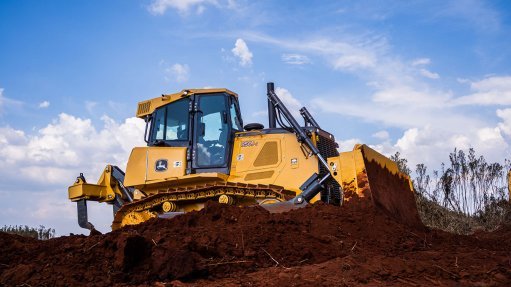Industry better prepared for infrastructure roll-out following 2011 bitumen shortages
After the October 2011 bitumen short- age in South Africa, suppliers are better prepared for government’s planned infrastructure plans to 2030 as a result of valuable lessons learnt in the management of bitumen during such shortages, says asphalt supplier Much Asphalt MD Phillip Hechter.
The company says it expects the industry to establish bulk bitumen storage facilities during the next three to five years to reduce the industry’s reliance on local refineries to keep up with the demand for bitumen, which will also alleviate supply constraints.
Meanwhile, suppliers, manufacturers and users of bituminous products have initiated interim solutions for periods of supply shortages and the industry is becoming comfortable with importing bulk shipments during these periods.
The bitumen industry in South Africa consumes between 400 kt and 450 kt a year. The combined capacity of the four refineries in the country can meet demand; how- ever, a combination of scheduled maintenance shutdowns and regular unscheduled shutdowns because of the age of the refineries, all of which are more than 30 years old, reduces their ability to meet demand.
The industry’s concern about these shutdowns is that they tend to happen during road construction’s busiest period, he says.
There was a shortage in October 2011 because two refineries were on scheduled maintenance and the other two experienced unscheduled breakdowns, which resulted in no bitumen being manufactured.
“The setback affected bitumen supply until May 2012,” added Hechter.
The refineries also export bitumen, so if the industry has the capacity to store bitumen in bulk, the need to import it will be reduced because there is enough bitumen.
A benefit of using asphalt in road construction is that it is 100% recyclable, as recovered bitumen remains active in the new mixture. Recycling is economically viable because the cost of new material increases, he explains.
Waste materials, such as rubber tyres, steel slag and glass, are used in the manufacture of asphalt and asphalt surfaces can be designed to generate less vehicular tyre noise than its concrete counterparts.
Studies in the US have shown that, on average, asphalt pavements are cost effective over a 40-year period and most roads worldwide are built using bitumen, which is unlikely to change in the future, concludes Hechter.
Comments
Press Office
Announcements
What's On
Subscribe to improve your user experience...
Option 1 (equivalent of R125 a month):
Receive a weekly copy of Creamer Media's Engineering News & Mining Weekly magazine
(print copy for those in South Africa and e-magazine for those outside of South Africa)
Receive daily email newsletters
Access to full search results
Access archive of magazine back copies
Access to Projects in Progress
Access to ONE Research Report of your choice in PDF format
Option 2 (equivalent of R375 a month):
All benefits from Option 1
PLUS
Access to Creamer Media's Research Channel Africa for ALL Research Reports, in PDF format, on various industrial and mining sectors
including Electricity; Water; Energy Transition; Hydrogen; Roads, Rail and Ports; Coal; Gold; Platinum; Battery Metals; etc.
Already a subscriber?
Forgotten your password?
Receive weekly copy of Creamer Media's Engineering News & Mining Weekly magazine (print copy for those in South Africa and e-magazine for those outside of South Africa)
➕
Recieve daily email newsletters
➕
Access to full search results
➕
Access archive of magazine back copies
➕
Access to Projects in Progress
➕
Access to ONE Research Report of your choice in PDF format
RESEARCH CHANNEL AFRICA
R4500 (equivalent of R375 a month)
SUBSCRIBEAll benefits from Option 1
➕
Access to Creamer Media's Research Channel Africa for ALL Research Reports on various industrial and mining sectors, in PDF format, including on:
Electricity
➕
Water
➕
Energy Transition
➕
Hydrogen
➕
Roads, Rail and Ports
➕
Coal
➕
Gold
➕
Platinum
➕
Battery Metals
➕
etc.
Receive all benefits from Option 1 or Option 2 delivered to numerous people at your company
➕
Multiple User names and Passwords for simultaneous log-ins
➕
Intranet integration access to all in your organisation


















